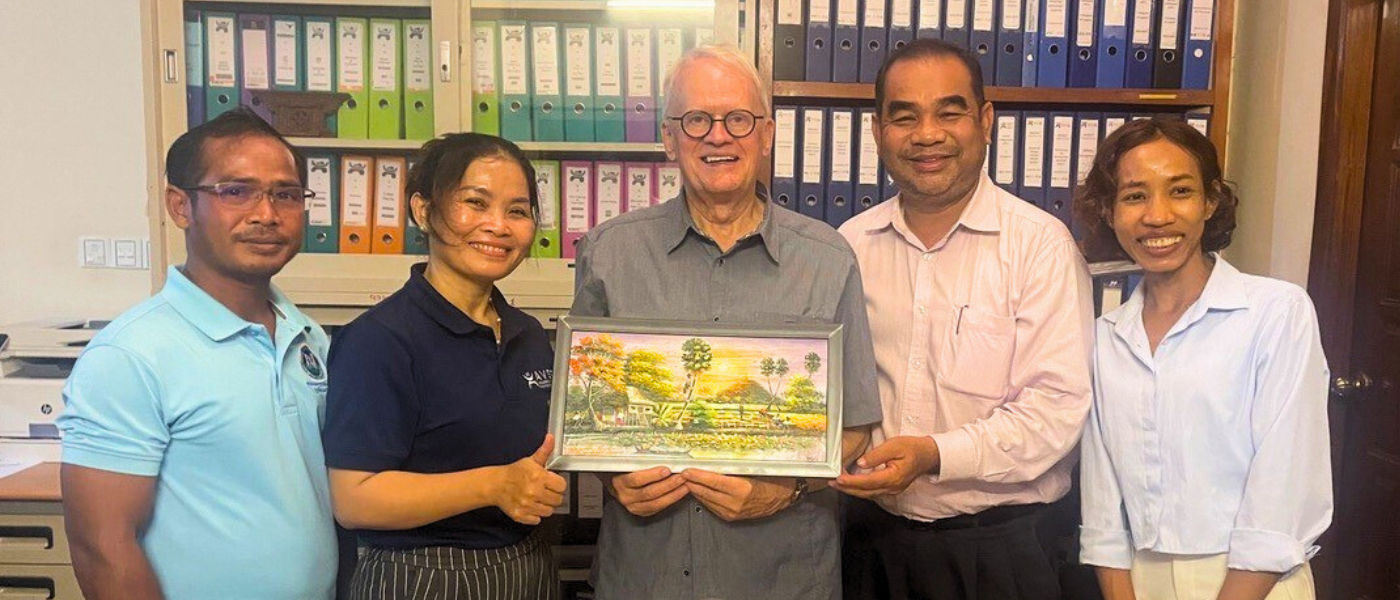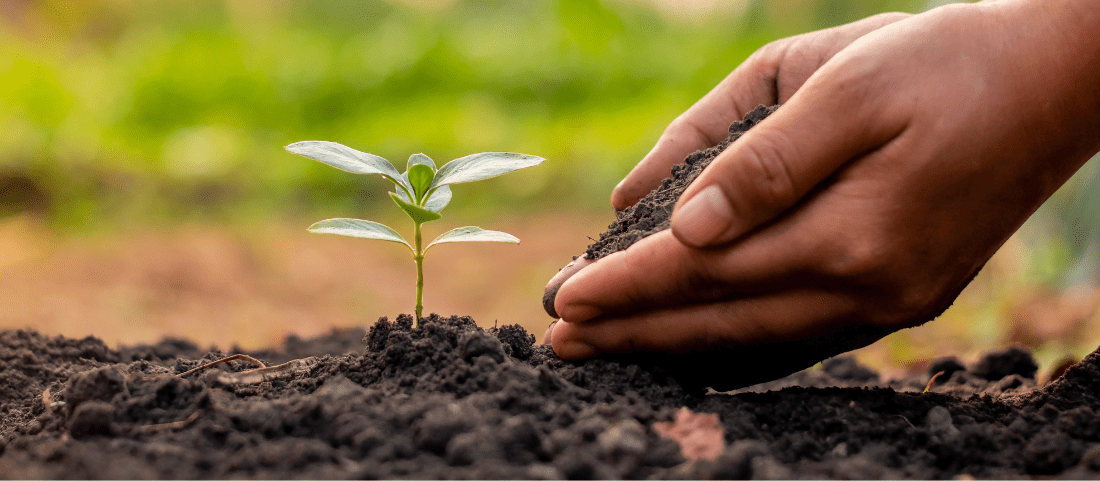#VETSVolunteerVoices aims to bring you the stories of our passionate VETS program volunteers from the field. Meet Harold Rudy, a Sustainable Agriculture Advisor who spent 3 months in rural Cambodia (September - December 2024).
When a former colleague told me about the VETS program, I knew this was the opportunity I had been waiting for. With over 30 years of experience working on environmental sustainability in Ontario’s agricultural sector, I had long wanted to contribute to international development. The Sustainable Agriculture Advisor placement in Cambodia with Agronomes et Vétérinaires Sans Frontières (AVSF) felt like the perfect fit.
Supporting Farmers Through Sustainable Solutions
From the moment I arrived in Preah Vihear province, I immersed myself in learning about the region’s agricultural challenges. My role was to train farmers on sustainable practices, strengthen AVSF and partner staff’s knowledge, and support new crop promotion. A key focus of my placement was integrating gender equality and climate action into every aspect of our work—critical efforts that contribute to Cambodia's long-term food security.
One major challenge I quickly identified was soil health. Continuous rice farming over the past 40 years had led to increasing soil acidity and a decline in organic matter. Yet, there was no infrastructure for soil testing, and most farmers lacked an understanding of how to assess and manage soil nutrients effectively.
 PHOTO: Sophoan Min, Executive Director, AVSF Cambodia
PHOTO: Sophoan Min, Executive Director, AVSF Cambodia
 PHOTO: PMUAC staff walking in rice field.
PHOTO: PMUAC staff walking in rice field.
 PHOTO: Harold teaching soil testing with pH paper strips.
PHOTO: Harold teaching soil testing with pH paper strips.
Introducing Simple, Low-Cost Soil pH Testing
Without access to proper soil testing laboratories, I focused on a simple but effective solution: pH testing. With inexpensive pH paper strips and distilled water, farmers could quickly determine whether their soil was too acidic and make adjustments.
Scientific research indicates that rice crops grown continuously in the same fields for decades can cause soil to become more acidic, reducing overall fertility. While long-term solutions like liming with calcium carbonate could be beneficial, a short-term, practical approach was needed. By demonstrating pH testing techniques and encouraging Preah Vihear Meanchey Union of Agriculture Cooperative (PMUAC) staff to continue testing soil samples, we took an important step toward raising awareness about soil health.
The enthusiasm I saw was inspiring—at my final workshop, staff eagerly took photos and videos of the process, showing real interest in carrying forward this knowledge.
Promoting Cover Crops for Long-Term Soil Health
Another key initiative during my placement was promoting cover crops like Sunn Hemp. Research has shown that planting a leguminous cover crop between rice harvests can significantly improve soil organic carbon levels, boost soil respiration, enrich the soil with nitrogen, and reduce soil degradation. When used in combination with other conservation measures, cover crops can increase Soil Organic Carbon (SOC) by up to one tonne per hectare per year, improving the long-term sustainability of the soil.
In fact, before I completed my work in Cambodia, PMUAC acquired enough Sunn Hemp seeds to cover 12 hectares of farmland, with 23 farmers committing to trialing the approach. A report in 2025 will evaluate the impact of this intervention, and I’m optimistic about the long-term benefits it could bring to soil health and farm productivity.
Exploring Crop Diversification: The Potential for Sesame and Potatoes
In addition to improving soil quality, I explored opportunities for crop diversification. Sesame and potatoes were two promising options. Farmers in Preah Vihear province were interested in growing organic sesame for export, but challenges like post-harvest drying and storage needed to be addressed. If irrigation could be introduced during flowering, sesame yields could be significantly improved.
Potato farming, on the other hand, presented logistical hurdles. Cambodia’s warm climate isn’t ideal for traditional potato varieties, which thrive in cooler conditions. However, plant breeders are working on new varieties that are more heat- and drought-resistant. I connected with a plant breeder in Vietnam who could provide disease-free seed potatoes, and several farmers in Preah Vihear were eager to participate. Unfortunately, logistical challenges, including transportation restrictions and the lack of a courier service to ship the seed potatoes across the border, delayed the initiative.
Although we couldn’t introduce potatoes this year, I believe they hold promise for future agricultural diversification and food security. With the right varieties, potatoes could be grown between annual rice crops during the cooler season, maximizing land use and resilience.
Engaging with Farmers: Knowledge Exchange in Action
One of the most rewarding parts of my placement was engaging with local farmers and PMUAC staff. I spent time in the field, listening to their concerns and assessing their needs. Through these discussions, I realized that soil testing was a new and unfamiliar concept for most farmers. Rather than overwhelm them with complex testing methods, I chose to introduce pH testing as an accessible entry point to soil health education.
During my final visit, I led a hands-on pH testing workshop with 12 staff members. Seeing their enthusiasm and commitment to continuing these practices after my departure was a highlight of my experience.
The Challenges and Future of Cambodian Agriculture
Smallholder farmers in Cambodia face many challenges, from declining soil fertility to competition from higher-value crops like cassava. Many farmers shared concerns that organic rice wasn’t yielding enough profit to justify the additional work required for certification.
 PHOTO: Harold (second from right) with organic certification auditors and staff of the Ramduol Samakimeanchey Mlupreypi Agricultural Union.
PHOTO: Harold (second from right) with organic certification auditors and staff of the Ramduol Samakimeanchey Mlupreypi Agricultural Union.
However, there are reasons for optimism. The Cambodian government has announced plans to hire 1,000 new agricultural extension workers, which could greatly improve access to training and support for farmers. Additionally, I arranged for several copies of Canada’s new Senate report, "Critical Ground: Why Soil is Essential to Canada’s Economic, Environmental, Human, and Social Health", to be shared with key stakeholders in Cambodia. Encouraging discussions around a national soil strategy could be an important step forward in ensuring the country’s long-term food security.
A Lasting Impact and Lessons Learned
During my time in Cambodia, I prepared eight discussion papers outlining key sustainability recommendations, encouraging PMUAC staff to use them as conversation starters with farmers, government agencies, and industry stakeholders.
One of my most memorable moments was meeting a farmer who, as a child during the Khmer Rouge era, had been forced to work on a reservoir construction project with only shovels and wheelbarrows—at a time when food was scarce. Hearing his story deepened my admiration for the resilience of Cambodian farmers. Today, the next generation is stepping up with the same determination, working to strengthen their communities with the resources available to them.
Advice for Future VETS Volunteers
For those considering a VETS placement in sustainable agriculture, my advice is simple:
- Stay adaptable. Local contexts vary, and flexibility is key to making an impact.
- Keep solutions practical. Farmers need realistic, low-cost interventions they can implement immediately.
- Understand that sustainability is multidimensional. While environmental conservation is crucial, economic viability and social factors are equally important.
- Foster ongoing conversations. Providing a framework for discussion can have a lasting impact beyond your time in the field.
Leaving Cambodia, I felt a deep sense of gratitude for the experience. The challenges were real, but so was the potential for change. As I continue my journey in sustainable agriculture, I know that the knowledge shared and relationships built during my time with VETS will remain with me for years to come.
 PHOTO: Harold (center) receiving traditional artwork by AVSF staff at his end-of-placement celebrations.
PHOTO: Harold (center) receiving traditional artwork by AVSF staff at his end-of-placement celebrations.
VETS is an 8-year initiative (2020-2028) to improve the economic and social well-being of marginalized people, particularly women and girls, in 6 countries across Africa and Asia. In collaboration with local partners, the program is implemented through 190 Canadian volunteers on international assignment and is generously funded by Global Affairs Canada. Learn more.





